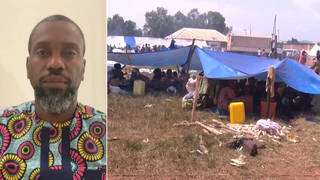
Guests
- Jan Egelandsecretary general of the Norwegian Refugee Council.
President Trump’s Africa envoy Massad Boulos has finished a tour of several East African nations, including the Democratic Republic of the Congo, where he discussed a peace deal that could involve the U.S. tapping the country’s rich mineral resources, including cobalt and lithium. Several Western mining companies are already reportedly lined up to take part in the U.S.-backed mineral resources partnership. “These people are among the poorest in the world,” says Jan Egeland, secretary general of the Norwegian Refugee Council. “They live on top of the incredible mineral riches that have been plundered by so many companies, so many colonial powers, so many of the neighbors of DRC. I hope the U.S. will really make sure there is an equitable deal, but that can really only happen if there is a peace agreement.”
Transcript
NERMEEN SHAIKH: Well, we also want to ask Jan Egeland, since you’ve recently returned from the Democratic Republic of Congo, you know, what the situation on the ground there is. President Trump’s senior adviser for Africa has just finished a tour of several East African nations, including the Democratic Republic of the Congo, DRC, where he discussed a peace deal that could involve the U.S. tapping its rich mineral resources in the war-torn east of the country, including cobalt and lithium.
This is Massad Boulos, speaking last weekend in Kigali, Rwanda, which neighbors the DRC.
MASSAD BOULOS: I can confirm, and I can affirm, that the United States also remains committed to this effort and is ready to facilitate an end to the conflict — obviously, a peaceful end to this conflict, an end that allows countries to secure their borders and lays the foundation for a thriving regional economy.
AMY GOODMAN: Rwanda has long been accused of propping up M23 fighters, who have been steadily advancing in eastern DRC, exacerbating an already catastrophic humanitarian situation. Over 7,000 people have been killed since the start of the year, over 1 million others forcibly displaced.
Jan Egeland, as secretary general of the Norwegian Refugee Council, you just rrecently from the eastern DRC. If you can end this conversation by talking about the gravity of the situation there and what needs to happen, as the U.S. once again, a kind of reprise of a very shameful history, is working on a mineral deal with the DRC?
JAN EGELAND: The Democratic Republic of Congo has been in turmoil, in fighting now for more than a generation, and especially in the eastern part of the country. And it has also, like Sudan, had a lot of attention in the past, now neglect, really.
I was in Goma, which is the capital of the eastern part of DRC, in the provinces of Kivu, fully under control of this rebel group, the M23. They have taken not only Goma, which is — was more than 2 million people, but also Bukavu, more than a million people in South Kivu. Paradoxically, by them controlling the whole area, people can now return home. So, for the first time in my many years of traveling to eastern Congo, many people had returned home — 1.8 million. I met them in four communities where the Norwegian Refugee Council is helping them reintegrate on their ancestral land. We will give them seeds. We will help them with farming and with education and with water again. They’re happy to be back. But 1.2 million others were displaced by the recent fighting when M23 took this territory from the central government army.
So I hope the U.S. will really do two things. Resume being the largest aid provider to the Democratic Republic of Congo. Many of the aid organizations there are dependent from 50 to 100% of their aid operations on the U.S. And when everything is cut overnight, of course, it has a devastating impact, and even now, when we could help people home and we could solve some of the problems.
And the minerals, yes, I mean, these people are among the poorest in the world. They’re among the most abused. And they live on top of the incredible mineral riches that have been plundered by so many companies, so many colonial powers, so many of the neighbors of DRC. I hope the U.S. will really make sure that there is an equitable deal that can benefit the people. But that can only happen if there is a peace agreement. And that has to involve the central government, the Rwandan — Rwanda, neighboring country, Uganda, Burundi, and the largest rebel groups, including M23.
AMY GOODMAN: Jan Egeland, we want to thank you for being with us, secretary general of the Norwegian Refugee Council, and Emtithal Mahmoud, the Darfurian refugee, Sudanese American poet and humanitarian activist, former refugee. We will link to your piece, as well.
This is Democracy Now! When we come back, One Day, Everyone Will Have Been Against This. We’ll speak with the award-winning author Omar El Akkad. Stay with us.













Media Options